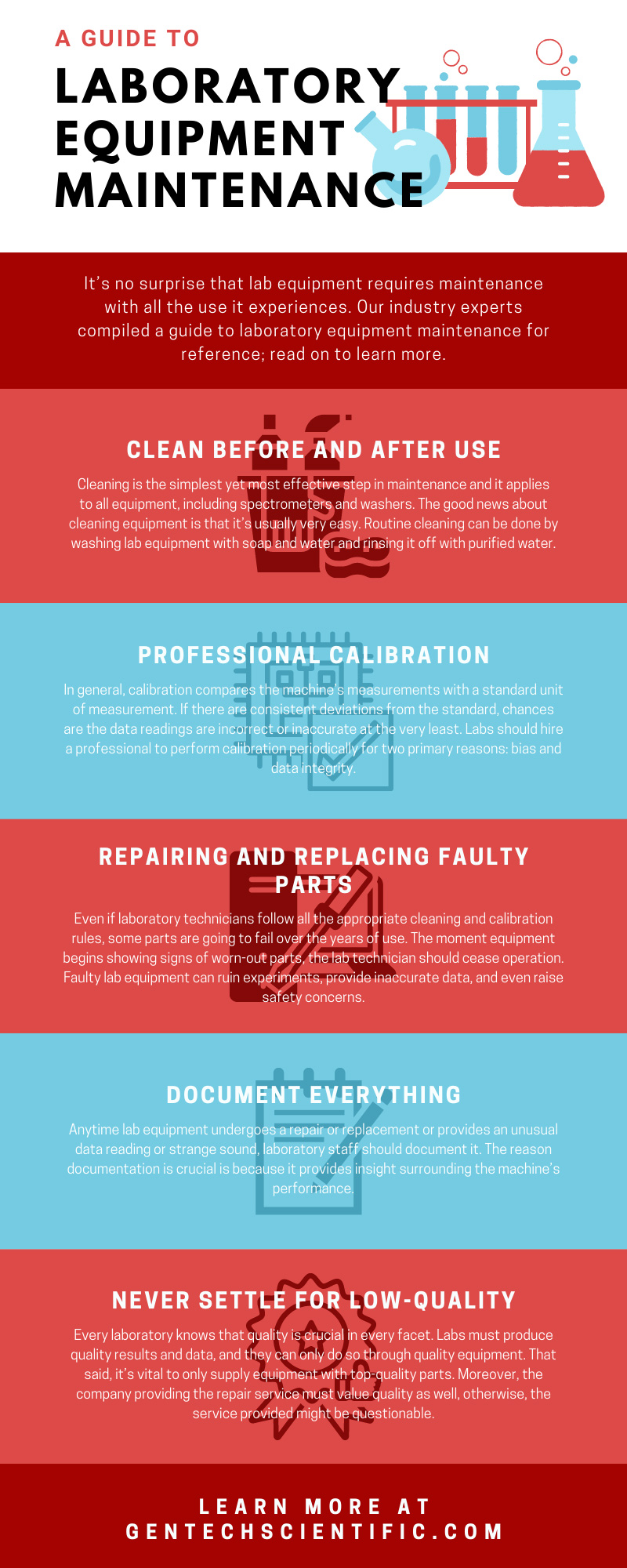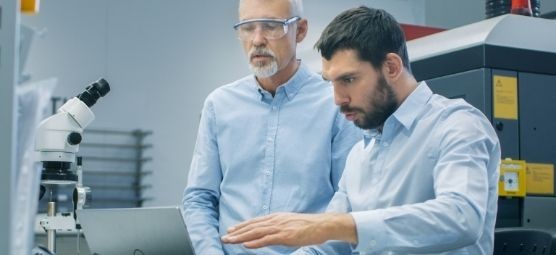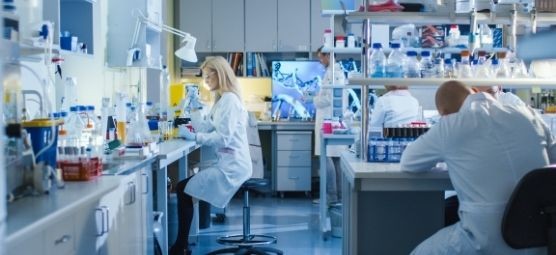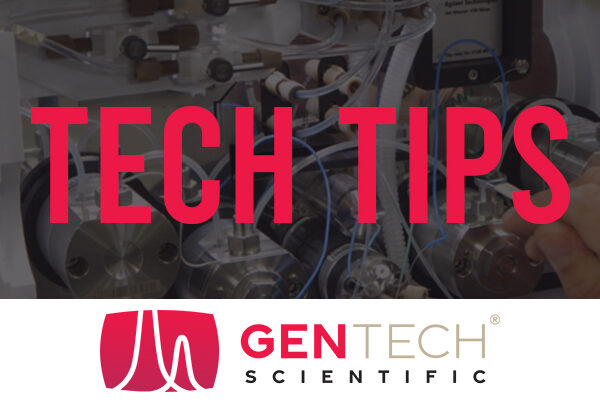The equipment used in a lab drives results, answers, and at times––new scientific discoveries. Laboratories would be inefficient, inoperable, and virtually useless without their equipment. It’s no surprise that lab equipment requires maintenance with all the use it experiences. What is surprising is the number of lab technicians who don’t know how to properly maintain their equipment. As with any other technology and machinery, lab equipment maintenance is vital for a number of reasons. First and foremost, without proper maintenance, the machine won’t operate at optimal performance. Without regular maintenance, the machine is also prone to experience downtime. Finally, proper maintenance extends the working lifespan of the equipment. Everybody who works in a lab must know the importance of proper maintenance and how to perform it. Our industry experts compiled a guide to laboratory equipment maintenance for reference; read on to learn more.
Clean Before and After Use
Cleaning is the simplest yet most effective step in maintenance and it applies to all equipment, including spectrometers and washers. The good news about cleaning equipment is that it’s usually very easy. Routine cleaning can be done by washing lab equipment with soap and water and rinsing it off with purified water. Unfortunately, there are times when soap and water aren’t quite strong enough, in which case lab techs may need a brush to buff out some residue. Finally, to remove encrusted residue, workers may need boiled purified water and a brush.
It’s crucial that all lab workers understand the importance of cleaning equipment before and after use. Even if the previous operator cleaned the machine after use, the current operator must ensure they’re working with a clean machine. A clean machine provides the most accurate results, while an unclean machine would certainly alter the results. Additionally, it’s vital to clean lab equipment regularly because dust, debris, and sample remnants may build up and negatively affect the machine’s performance. Lastly, for the machine’s longevity and performance, it’s in the lab’s best interest to procure the services of a professional lab equipment technician periodically to deep clean the machine.
Professional Calibration
Calibration is vital to the machine’s performance and data results. In general, calibration compares the machine’s measurements with a standard unit of measurement. If there are consistent deviations from the standard, chances are the data readings are incorrect or inaccurate at the very least. Labs should hire a professional to perform calibration periodically for two primary reasons: bias and data integrity. It’s not uncommon that lab technicians develop biases regarding the standard measurements. Additionally, companies, governments, and the general society depend on labs for accurate data. For the best results, professional service technicians should be the only individuals completing calibrations.
There are a few signs to watch for that indicate that a particular machine requires calibration. First, if the equipment is hit or dropped, it may provide inaccurate results. The equipment also requires calibration if lab technicians notice peculiar sounds or data patterns coming from the machine. Calibration is also vital when data accuracy is critical. Of course, every lab should seek the most accurate data as possible, but experiments in the medical and pharmaceutical industries, for example, cannot have questionable data.
Repairing and Replacing Faulty Parts
Even if laboratory technicians follow all the appropriate cleaning and calibration rules, some parts are going to fail over the years of use. The moment equipment begins showing signs of worn-out parts, the lab technician should cease operation. Faulty lab equipment can ruin experiments, provide inaccurate data, and even raise safety concerns. Repairs and new parts will give the machine new life and prolong its working lifespan. It’s vital that an experienced lab equipment technician completes any analytical instrument repair or part replacements. If a professional servicer doesn’t complete the repair or replacement, there’s a high possibility that something may go wrong that could affect the machine’s overall performance.
Document Everything
Anytime lab equipment undergoes a repair or replacement or provides an unusual data reading or strange sound, laboratory staff should document it. The reason documentation is crucial is because it provides insight surrounding the machine’s performance. Lab techs may notice that an unusual sound occurs when they perform a specific experiment; this is usually a tell-tale sign of a failing part. Through documentation, labs can make better financial decisions and determine if their current machine is experiencing more repairs than use. The documentation also provides financial history regarding repairs so leadership can conclude if they’re overspending and need to find a new partner.
Never Settle for Low-Quality
Every laboratory knows that quality is crucial in every facet. Labs must produce quality results and data, and they can only do so through quality equipment. That said, it’s vital to only supply equipment with top-quality parts. Moreover, the company providing the repair service must value quality as well, otherwise, the service provided might be questionable. Although it might be tempting to go with a company or part that’s more affordable, the quality of such services and goods is rarely satisfactory. Furthermore, quality shouldn’t be a negotiable factor in any lab because the data produced from experiments can be detrimental if it’s inaccurate. Finally, a lab that values quality merely demonstrates their integrity, and a lab with high standards and integrity always succeeds in the end.
As the lab owner or manager, you have many responsibilities. You’re responsible for the employees and their safety, the data that leaves the lab, and the lab’s equipment. Of course, you can’t maintain the equipment on your own, nor should you. If you take quality and your employees’ safety seriously, you must train and effectively communicate how to maintain equipment properly. Our guide to laboratory equipment maintenance provides guidance and actionable insight for your lab’s success. As you likely noticed, much of the maintenance is easy and can occur in your lab, but sometimes you must hire a professional. Unfortunately, not all lab equipment companies offer quality products and service, but we do.
GenTech Scientific is a premium lab equipment company that specializes in refurbished analytical instruments and service. We know every lab operates on a budget but wants the best results, and that’s why our prices are fair. Moreover, our team consists of industry experts, giving us the know-how and experience necessary to provide unbeatable service. Whether you need a repair, a part, or an entirely new machine, GenTech Scientific has you covered. We refuse to settle for anything less than excellent quality, so all our machines leave our technicians’ hands like-new. If you’re interested in requesting pricing, service, financing, or you’d like to sell or trade your machine, contact our team today––we look forward to working with you.







